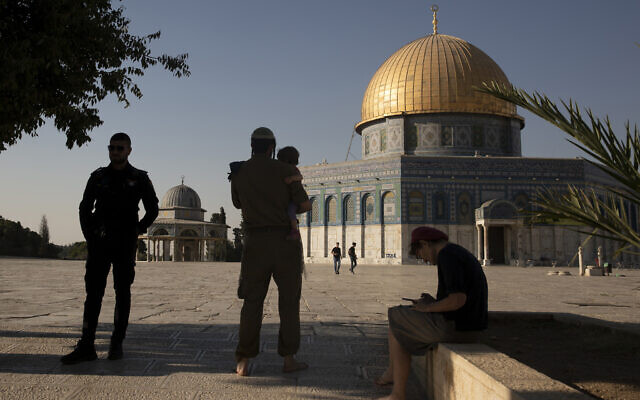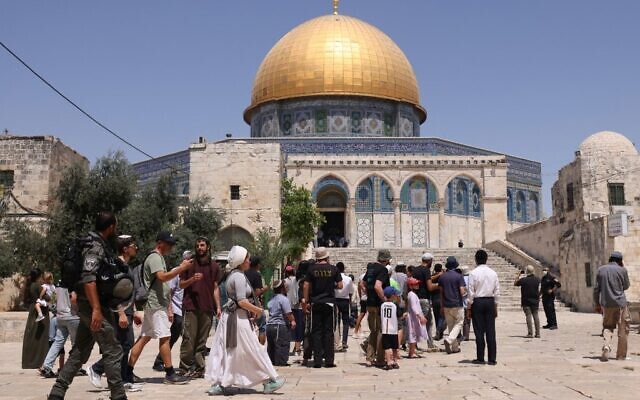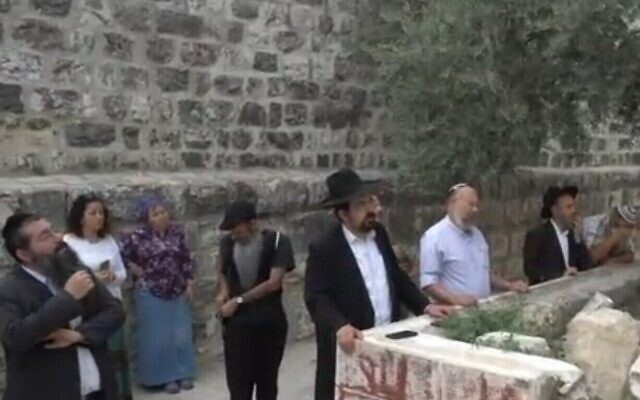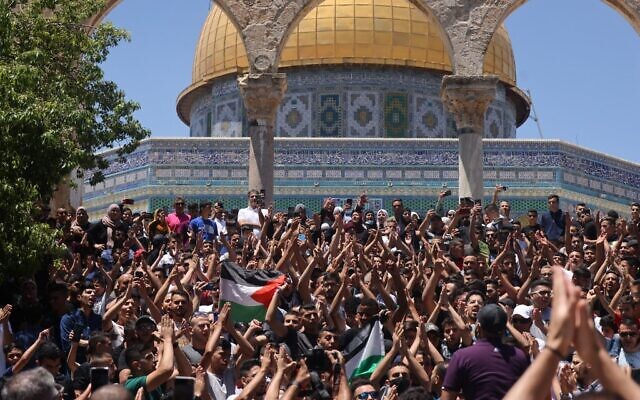Israeli court was not ruling on legality of Jewish prayer, which is outlawed, but lifted a ban police had imposed on worshiper; cops appeal; Palestinians, Jordan lead objections

A ruling by the Jerusalem Magistrate’s Court in favor of a Jewish man who prayed quietly at the Temple Mount has angered Muslim authorities, who denounced it on Thursday as a violation of the fragile status quo governing the flashpoint compound.
The Temple Mount, known to Muslims as the Haram al-Sharif, is the holiest site for Jews and site of the third holiest shrine in Islam. It is the emotional epicenter of the Israeli-Palestinian conflict, and tensions there helped ignite the 11-day Gaza war in May.
Under understandings reached after Israel captured the Old City and East Jerusalem in the 1967 war, Jews are allowed to visit but not to pray there. Israel maintains overall security at the site, but the Muslim Waqf administers religious activities there.
The ruling by the magistrate’s court concerned a Jewish man, Aryeh Lippo, who had been barred from the site for 15 days after Israel Police caught him quietly praying there.

The court lifted the ban several days early, ruling that the man, “like many others, prays on a daily basis on the Temple Mount.”
Judge Bilhah Yahalom’s legal ruling was narrowly focused on overturning Lippo’s ban from the plaza.
But commenting on his conduct, she wrote: “The appellant stood in the corner with a friend or two, there was no crowd around him, his prayer was quiet, whispered.”
“I have not found that the religious acts carried out by the appellant were externalized and visible,” she ruled, determining that such prayer did “not violate police instructions,” and canceling his ban from the site.
Israeli police appealed the ruling, arguing that Lippo engaged in “improper conduct in the public sphere.”
Magistrate courts make up the lowest level of the Israeli judiciary and hear cases concerning relatively minor crimes.
Under a longstanding but informal arrangement known as the status quo, Jews are allowed to visit the site but not pray there. The agreement has frayed in recent years as groups of Jews, including hard-line religious nationalists, have regularly visited and prayed at the site. The Israeli government, nonetheless, says it is committed to maintaining the status quo.
Many Palestinians as well as neighboring Jordan, which serves as the custodian of the holy site, fear that Israel plans to eventually take over the compound or partition it — as it did with a similarly contested holy site in Hebron, in the West Bank. Israel repeatedly denies any such plans.
The Islamic Waqf that overseas Al-Aqsa called the court’s ruling a “flagrant violation” of the compound’s sanctity and a “clear provocation” for Muslims worldwide.

“This decision also has no legitimacy because we do not recognize Israeli law on al-Aqsa,” mosque director Sheikh Omar al-Kiswani told AFP.
Egypt denounced the decision as a “violation” and said it held “deep concern about the consequences.”
Abdullah Kanaan of Jordan’s Royal Committee for Jerusalem Affairs rejected the ruling as an attack on the mosque and pledged to “firmly” counter Israeli rulings against the Palestinian people and Jerusalem sanctities, according to the state-run Petra news agency.
The Saudi Arabia-based Organization of Islamic Cooperation strongly condemned “the decision of the so-called Israeli ‘Jerusalem Court.’”

Some Jewish activists were meanwhile underwhelmed by the impact of the decision.
Long-time activist for Jewish Temple Mount prayer Arnon Segal stressed that despite the ruling’s sentiment, “the simple truth is that (Jewish) prayer is prohibited on the Temple Mount.”
“There’s no change in policy,” he wrote on Twitter, noting that on Thursday police had detained a Jewish man for silent prayer, accusing the state of “trampling” the rights of those prevented from praying.
Segal further told AFP that not only was the ruling was not a precedent, but it would also likely harm his cause.
“The harsh Palestinian reaction to the very weak ruling will deter the justice system and the state from even enabling quiet prayers,” he said.
Mainstream rabbinical authorities oppose Jewish prayer and even visits to the Temple Mount, out of concern that visitors might tread on the area where the Temple’s Holy of Holies stood, defiling it. Instead, Jewish worship is centered at the Western Wall plaza below.

In a ruling earlier this year on a petition demanding Temple Mount prayer rights for Jews, Israel’s Supreme Court found that “every Jew has the right to pray on the Temple Mount, as part of the freedom of religion and expression.”
“At the same time, these rights are not absolute, and can be limited to take into account the public interest.”
Friday prayers at the mosque are regularly attended by tens of thousands of Palestinians and are sometimes followed by protests and clashes with Israeli police.
Israel captured East Jerusalem — including the Old City and its holy sites sacred to Jews, Christians and Muslims — in the 1967 war and annexed it. The move was not recognized by most of the international community, although the US, under the Trump Administration, recognized Jerusalem as Israel’s capital and moved its embassy to the city. The Palestinians seek East Jerusalem as the capital of their future state. The city’s status has been among the most divisive issues in decades of failed peace efforts.
As reported by The Times of Israel
